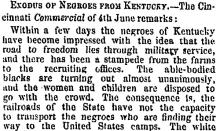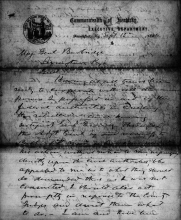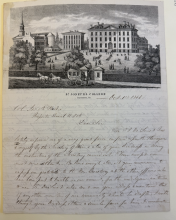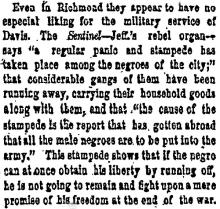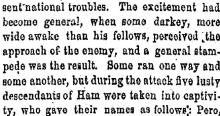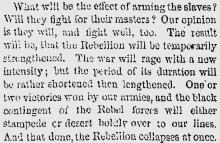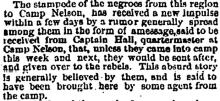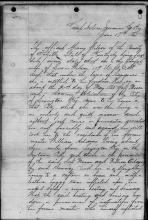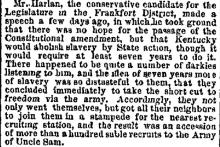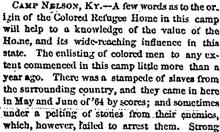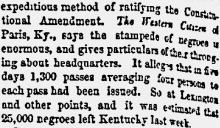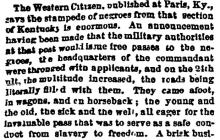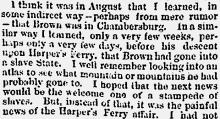View All Documents // 1840s // 1850s // 1860s
Displaying 201 - 224 of 224
EXODUS OF NEGROES FROM KENTUCKY. – The Cincinnati Commercial of 4th June remarks:
Commonwealth of Kentucky,
EXECUTIVE DEPARTMENT.
Frankfort, Ky., Sept 15th, 1864.
Maj Genl Burbridge
Lexington Ky
Genl.
ST. JOSEPH'S COLLEGE
Bardstown, Ky. ----Oct. 1st 1864
TELEGRAPH TO THE HERALD
FROM THE SOUTH
WITHDRAWAL OF MR. FOOTE FROM THE REBEL CONGRESS.
His Opinion of Jeff. Davis.
THE “CONFEDERACY” TUMBLING TO PIECES.
GEN. LEE REPORTED SEVERELY WOUNDED.
Stampede of Negroes to the Union Lines.
THE SLAVES TO BE ARMED IMMEDIATELY.
Seizure of Every Able Bodied Negro by the Rebel Government.
Great Stampede of Negroes from Richmond.
HOW THEY FIGHT FOR THEIR MASTERS.
[From the Richmond Sentinel, Dec. 23.]
A regular panic and stampede has taken place among the negroes of this city. Between forty and fifty have run off to the Yankees since last Saturday, in most cases carrying their trunks and household goods. On Wednesday night seven negroes belonging to Mr. Valentine Ricklar, living just beyond Union Hill, went off, carrying all their furniture. The cause of the stampede is the report that has gotten abroad that all the male negroes are to be put into the army.
General Lee and the Negro Soldiers Question––The Richmond Negroes Running to Avoid the Draft.
TELEGRAPH TO THE HERALD
THE CONFEDERACY "UNDER A CLOUD."
How Jeff. Davis' Salary was Increased.
The Exchange of Prisoners is to be Resumed at Richmond.
STAMPEDE OF NEGROES TO AVOID CONSCRIPTION.
Richmond Papers Doubt the Capture of Savannah.
NEW YORK, Dec. 27th. The Richmond examiner of Saturday acknowledge that the affairs of the Confederacy are under a real cloud.
Jeff. Davis having asked for an increase for salary, a bill was passed by the rebel Senate to provide for lighting and warming to the executive mansion and for the supply of forage and commissary stores for the commander-in-chief of the army and navy of the so-called Confederate States.
Local Intelligence.
MUNICIPAL COURT.
HIS HONOR, MAYOR COLEMAN, PRESIDING.
MONTGOMERY, ALA., Jan. 5, 1865.
Arming the Slaves.
The Rebel leaders are conscious that in adopting the policy of arming the Slaves, they are embarking in a perilous enterprise. They approach the subject with fear and trembling. They know they are taking a step which m ay result not only in the ruin of their cause but in the destruction of society itself. They are well aware that the arms they propose to put into the hands of the servile masses may be turned against their own breasts, and the power they delegate may be a power that will be used to crush them. They are not without misgivings that the education in arms they intend to confer upon the Blacks will be "improved" not only to achieve their own Freedom, but to expel the white race as well.
How Emancipation Works.
THE SITUATION.
The town of Lynchburg, Virginia, which from the commencement of the war the rebels had been able to maintain possession of, and which only a week ago was considered of sufficient strength to withstand for some time, if Lee could get his army within its works, a siege of the entire Army of the Potomac, surrendered on Tuesday to a lieutenant colonel in command of a Union scouting party, and is now garrisoned by a brigade of national troops.
STAMPEDE OF NEGROES.
DANVILLE, KY., April 22, 1865.
To the Editors of the Louisville Journal:
The stampede of negroes from this region to Camp Nelson, has received a new impulse within a few days by a rumor generally spread among them in the form of a message, said to be received from Captain Hall, quartermaster at Camp Nelson, that, unless they came into camp this week and next, they would be sent after, and given over to the rebels. This absurd story is generally believed by them, and is said to have been brought here by some agent from the camp.
Camp Nelson, Jessamine Co. Ky.
June 17th 1865
How Dinah Got a Companion for Life.
"Mack," writing from Lexington (Ky.) to the Cincinnati Commercial, says:
Mr. Harlan, the conservative candidate for the Legislature in the Frankfort District, made a speech a few days ago, in which he took ground that there was no hope for the passage of the Constitutional amendment, but that Kentucky would abolish slavery by State action, though it would require at least seven years to do it. There happened to be quite a number of darkies listening to him, and the idea of seven years more of slavery was so distasteful to them that they concluded immediately to take the short cut to freedom via the army. Accordingly, they not only want themselves, but got all their neighbors to join them in a stampede for the nearest recruiting station, and the result was an accession of more than a hundred sable recruits to the Army of Uncle Sam.
Shearman House, Chicago, Il., July 6th, 1865.
MY DEAR FRIENDS,
J.H. TUKE, AND F. SEEBOHM,
In my last letter from Cincinnati, I mentioned that whilst at Camp Nelson, Levi Coffin and I had attended a meeting of freedmen. This meeting was, to me at least, a very interesting one; and, though I cannot hope to make my account of it at all worthy of the occasion, I purpose jotting down a few details, seeing that they may convey a fair idea of what such occasions are in general.
Refugees Home in Kentucky.
For the Worcester Daily Spy.
...This is an age of wonders, and not the least among them is the celebration of the Fourth of July at Camp Nelson, Ky., by the colored people. To see so many thousands, who a year ago were slaves, congregate in the heart of a slave State and celebrate the day sacred to the cause of freedom, "with none to molest or make afraid," was a grand spectacle. It was the first time we have ever been permitted to celebrate the Nation's Day. The celebration was under the management of Capt. [T. E.] Hall, and Rev. J. G. Fee. These men deserve much credit for their zeal and untiring activity in the cause of our race. The people gathered in from far and near. With several regiments of colored soldiers, with the thousands at the Refugee Home, and with the many from different parts of the country, the numbers swelled to many thousands. Such an assemblage of colored people on the "sacred soil of Kentucky" was never before beheld.
Kentucky and other papers have lately published what purported to be an order from Gen Palmer, or by his authority, granting passes to all negroes who desired to leave the State— an expeditious method of ratifying the Constitutional Amendment. The Western Citizen of Paris, Ky., says the stampede of negroes is enormous, and gives particulars of their thronging about headquarters. It alleges that in five days 1,300 passes averaging four persons to each pass had been issued. So at Lexington and other points, and it was estimated that 25,000 negroes left Kentucky last week.
But now comes The Cincinnati Enquire of August 1, with this statement
STAMPEDE OF NEGROES IN KENTUCKY.
General Palmer to the President.
HEADQUARTERS, DEPARTMENT OF KENTUCKY, }
LOUISVILLE, Ky., July 27, 1865 }
To his Excellency ANDREW JOHNSON, President of the United States:––
Slavery in Kentucky.
General John M. Palmer, commanding the Department of Kentucky, has addressed the following letter to President Johnson in answer to the charge that the provost-marshals of his department were in the habit of issuing "free papers" to colored persons, without regard to the legal right of those receiving them to freedom––
"HEADQUARTERS, DEPARTMENT OF KENTUCKY, }
LOUISVILLE, Ky., July 27, 1865 }
To his Excellency ANDREW JOHNSON, President of the United States:––
. . . I was born in Nelson County, Kentucky, and lived there until I was eighteen years of age, at which time I went to Louisville, and was in that city when the late horrid rebellion broke out. I enlisted in the 12th U.S. Colored Heavy Artillery in the Fall of 1864, and my only sorrow is that I did not enlist sooner. I left a home such as would have made a slave happy, as long as there was a grain of happiness to be found in slavery. While living in Nelson county I indeed thought that it was right that all colored people should be slaves, and I was far from being the only one having the same opinion; but oh, how different now! There were five or six colored people in the county who could read, and they were disliked very much by the white people on that account; so you see, although we were capable of being taught, the fear of our masters and mistresses kept us bound in the frontiers of ignorance.
COMMUNICATIONS.
Recollections of the Underground Railroad.
NUMBER TWO.
We had also agencies and stations at Baltimore–Jacob R. Gibbs and our lamented friend; Darius Stokes. At Alexandria we had a host of true friends. Now for the modus operandi:
The Plans of John Brown.
Gerrit Smith writes a long letter, in which he denies that he know [knows] anything of John Browns’ invasion scheme. He also relates some interesting circumstances in regard to that old her. Mr. Smith says:

